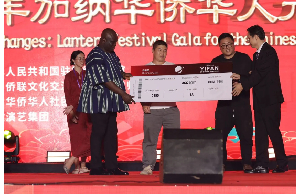A three-day retreat dubbed: The Caucus of Chairpersons of Political Parties (CCPP) has been held by the Institute of Economic Affairs (IEA).
The retreat, which was held at the Royal Senchi Hotel near Akosombo on August 1 to 3, brought together chairpersons of the National Democratic Congress, New Patriotic Party, Convention Peoples Party and Peoples National Convention.
A statement issued in Accra by Mrs Jean Mensa, Executive Director of IEA and copied to the Ghana News Agency on Wednesday, said the retreat, which formed part of IEA’s regular meetings of the CCPP under the Ghana Political Parties Programme (GPPP), collectively contemplated, discussed and reviewed the experiences, achievements, challenges and prospects in respect of the following issues.
The GPPP, State of the Economy, Democracy and Governance in Ghana, Role of Political Party Chairpersons in Consolidating Democracy in Ghana and the Building of Trust, Respect and Confidence in the Politician.
Resource persons including Dr Michael Ofori-Mensah and Dr Ransford Gyampo, both of the IEA, Gabriel Pwamang, a private legal practitioner, Prof Mike Ocquaye, Former Deputy Speaker of Parliament and Nana Ato Dadzie, Former Chief of Staff assisted in the discussions.
The Caucus said the degeneration in the political discourse of the country was deepening the polarization of the society and gradually sacrificing the grave issues of national development and substance of public policy.
“They also recounted the achievements that have been chalked under the GPPP as well as the continuing challenges particularly in the area of building individual political parties into professionally organised institutions manned by competent, well trained and responsible party activists,” it said.
According to the statement, participants underlined the existing challenges to Ghana’s democracy and governance system particularly the apparent ineffective checks on the powers of the Executive and Presidency under the 1992 Constitution, the imbalance of power between the executive and legislature on the one hand and the executive and the leadership of the political party in power on the other hand.
“The composition of the Council of State that adversely affects the effectiveness in the discharge of their constitutional functions, the deficiency in our local government structure that leaves too much resources and control in the hands of the Central Government, the widely acclaimed weaknesses in our electoral processes and the urgent need for reform and the persistent under representation of women in our governance structures like parliament and the district assemblies,” it said.
According to participants, the failure of Ghana’s politics to substantially transform the living conditions of the broad mass to citizens and taking them out of poverty made a reform of the governance system urgent in order to respond to the cries of Ghanaians and restore their confidence in politicians.
They said most of the democratic governance and developmental challenges discussed above transcended individual political party boundaries and needed to be continuously confronted in a cross-party manner irrespective of whichever party was in power.
“Members of the Caucus also recognised the important and critical positions they occupy as chairpersons of the major political parties in Ghana in the nation’s governance system and noted that their responsibilities are not only to their individual political parties but extend to the wider Ghanaian society, particularly at this fledgling state of our democratic development,” the statement said.
The CCPP noted that acting together as Caucus of Political Party Chairpersons of Ghana with trust and confidence in one another, they could achieve a lot by improving upon the economic development of Ghanaians, promote transparent and democratic governance, fight corruption and ensure peace, unity and stability of the nation.
The statement, however, said the CCPP resolved to adopt measures that would help them dedicate themselves to the effort of building their individual political parties into professionally organised institutions that would train and mentor political leaders for the country.
“To renew their commitment to engage in interparty dialogue with trust and confidence in one another under the Ghana Political Parties Programme with the view to sanitising the political atmosphere in Ghana, ensuring peaceful coexistence of all political parties, improving on our democracy and ensuring substantial economic development for the generality of our people.
“To call on all governance institutions in Ghana to cooperate with the Caucus of Political Party Chairpersons to assist in finding cross-party solutions to issues of governance and development which are better resolved through interparty dialogue than unilateral action by state institutions.
“To call on the media to help with the efforts of the Caucus of Political Party Chairpersons aimed at reducing the polarization of our society along partisan lines by de-politicizing discussions of issues of national development that require national consensus.
“To commit ourselves to work assiduously towards the achievement of the above resolutions,” the statement said.
Politics of Thursday, 7 August 2014
Source: GNA
Three-day retreat for party chairpersons held
Entertainment












